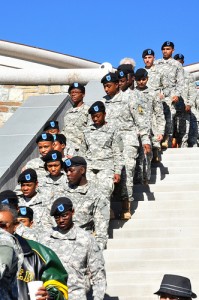Why Higher Education Is More Difficult For Veterans

Virginia Guard Public Affairs / Flickr
Veterans say they face challenges attending college that other students do not.
When a high school senior is deciding which college to attend, he or she has an army of people ready to help.
Parents. Guidance counselors. College admission officers. Friends.
Most all of them have been through the process already.
But veterans say things are different for them. And despite one of the most attractive benefits of military service is the assistance paying college tuition, vets say it can be difficult to get the advice and help they need.
“It took me more than a semester to figure out my GI Bill benefits,” said Ryan Galluci, deputy legislative director with the Veterans of Foreign Wars. Galluci said only 58 percent of veterans knew they were eligible for college benefits, according to a survey.
Student Veterans of America hosted a conference in Orlando this week to discuss the issues and how to solve them.
Among the biggest items on veterans’ wish list? That more states allow veterans access to in-state tuition rates.
In some cases they are residents of the state or stationed in the state long enough to earn residency, veterans said, but military documentation lists another state.
Florida law gives in-state tuition rates to active duty members of the military. Veterans are eligible for one tuition deferment each academic year and additional deferments if benefits are delayed.
Students Veterans of America executive director Michael Dakduk said the issue is a priority for his group. However, the group is sensitive to seeking a federal bill to require state universities to grant in-state tuition.
Higher education experts also note another common problem: The various government agencies working with veterans don’t work with each other all the time.
That means that federal resources, such as the College Navigator, don’t include data that might help veterans choose a school that’s best for them.
“The Department of Veteran’s Affairs has this data,” said Jennifer Steele, a researcher at RAND Corporation. “The Department of Education has the navigator. They don’t talk to each other very well. They can do this better.”
In general, experts said, data about veterans attending college isn’t very detailed.
Dakduk said another issue is college and university career training programs.
College students often have little to no experience when seeking internship and job placement services. But veterans often have several years of useful experience. Colleges sometimes don’t have the ability to help veteran find positions to build on that experience, Dakduk said.
But help could be on the way.
While Congress finished up the so-called ‘fiscal cliff’ deal, supporters also won approval for H.R. 4057. The bill requires the VA to design an information clearinghouse for veterans wanted to attend college.
The department must also must track and publish feedback from students and state agencies about recruiting, instruction, and post-graduation placement at higher education institutions. Read the full bill here.